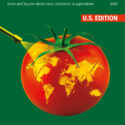How do we know what we know about food? Why do we believe what we believe about what we eat? At Real Food Media, we work to unmask the billion-dollar messaging machine that tries to shape our most fundamental beliefs about food.
Our Spinning Food series, developed in partnership with Friends of the Earth and US Right to Know Network, investigates how Big Food and agrochemical corporations are deliberately misleading the public—and the media—about industrial agriculture and organic and sustainable food production.
Taking lessons from tobacco industry spin, the food and agrochemical industries are spending hundreds of millions of dollars every year on stealth public relations tactics, from engaging “third party allies” to mimic grassroots support to deploying “front groups” that are funded by the same corporations whose interests are at stake. These tactics are being used to push coordinated messages attacking organic food production, defending pesticides, and promoting GMOs—messages that are making their way into the pages of our largest media outlets.
Our 2013 report, Spinning Food: How Food Industry Front groups and Covert Communications are Shaping the Story of Food, detailed how these companies are trying to preserve their market share and advance policy agendas by deploying these tactics and more, including producing advertising disguised as editorial content, attacking scientists and investigators, and using other covert media tactics to influence public opinion and sway policymakers without most people realizing the story is being shaped behind the scenes to promote corporate interests. The report sheds light on how the industrial food and agriculture sector is trying to defuse concerns about the real risks of chemical-intensive industrial agriculture and undermine public confidence in the benefits of organic food and diversified, ecological production systems.
Merchants of Poison: How Monsanto Sold the World on a Toxic Pesticide, released in 2022, tells the tale of pesticide industry disinformation, including science denial techniques, attacks on scientists, astroturf strategies, online domination of industry messaging, and other spin tactics. This a multi-year research project is a case study of Monsanto (now owned by Bayer) and its decades-long product-defense campaign of its best-selling weedkiller, Roundup and other glyphosate-based herbicides. The report exposes how the pesticide industry—just like Big Tobacco and Big Oil—uses obfuscating PR tactics to protect its products despite their planetary and public health harm.
We hope our Spinning Food work helps reporters, policymakers, opinion leaders, and the public bring increased scrutiny to the food industry’s messages and messengers. By revealing key groups and tactics used by industry, we also hope that this work helps generate more balanced and accurate reporting on our food system.
Download Merchants of Poison: How Monsanto Sold the World on a Toxic Pesticide


